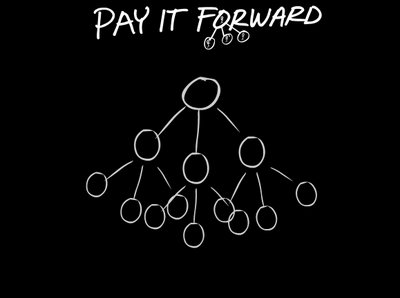God @ The Movies: Pay It Forward
 Who expects you to be somebody?
Who expects you to be somebody?Who has elevated your expectations?
Ever have a day or a night like this? A reporter has just arrived on the scene of a hostage taking; pay close attention to what happens to his vintage 1965 Ford Mustang.
Scene 1 Chapter 1 2.10- 4.31
The man says, “Consider it a little generosity between two strangers.”
We find out later that the generous man is a lawyer, so we know grace must be involved!
Scene 2 Chapter 3 7.34-11.11
One day you’ll be free. That day starts today if you’ll let it.
"What does the world expect from you? Nothing! What if the world is a big disappointment? Unless you take the things you don't like and turn them upside down. And, you can start that today." Eugene Simonet
There are scars on Mr. Simonet’s face from deep fire burns.
Think of an idea to change our world- and put it into ACTION!
Mr. Simonet speaks of ‘the realm of possibility’. He challenges his students into deep learning. What is learning? Putting concepts, mental frameworks into action, willing behavior change.
The word ‘disciple’ is used 269x in the New Testament. It’s the favorite word that Jesus used for his follower & it means a learner. A disciple is one who lets learning drive our behavior because it changes our character.
That’s how Christians change the world!
In this next scene Trevor sees a picture that he doesn’t like. In fact he goes out of his way to witness it. He doesn’t avoid it. You can see the gears moving in his head as he watches: Can this change? Can I change this?
Scene 3 Chapter 4 13.28-15.00
So what he do? He breaks bread with a homeless man. Now this is not without some consequences. The homeless man is allowed to sleep in the garage & in turn works on Trevor’s moms broken down pickup. Mom doesn’t know this, but upon hearing some noise in the garage goes out with a shotgun to find out what’s happening.
Scene 4 Chapter 9 31.25-35.00
Sadly, the only pyramid scheme some follow is network marketing, not trying to change the world through acts of kindness or sharing grace.
Pay it forward. The rules:
#1 It has to be something that really helps people.
#2 Something they can't do by themselves.
#3 I do it for them, they do it for three other people.
In his book, Blink, Malcolm Gladwell tells of an experiment done by a psychologist named John Bargh at New York University.
Bargh and several colleagues chose a group of undergraduates as subjects and gave them two scrambled-sentence tests. The first test was sprinkled with rude words like “disturb,” “bother,” and “intrude.” The second test was sprinkled with polite words like “respect,” “considerate,” and “yield.”
In both cases, the tests were indiscreet. None of the subjects picked up on the word trend consciously. But they paid it forward.
After taking the five-minute test, students were asked to walk down the hall and talk to the person running the experiment about their next assignment. An actor was strategically engaged in conversation with the experimenter when the students would arrive. And the goal was to see how long it would take students to interrupt.
Bargh wanted to know if the people who were encouraged with polite words would take longer to interrupt the conversation than those with rude words. They thought the that it would have a small affect. But the affect was pretty profound in quantitative terms.
The people set up with “rude” words interrupted, on average, after about five minutes. But 82% of the people set up with polite words never interrupted at all. Who knows how long they would have patiently and politely waited if the researchers hadn’t give the test a ten-minute time limit.
The study dramatically shows the effect of paying it forward.
A budding romance develops between teacher & mom but the past surfaces and rears its ugly head. The homeless man goes back to drugs. The romance between mother and teacher seems to be failing. The abusive father is back. Trevor attempts to run away at the bus station, but his mom & Mr. Simonet find him.
Scene 5 Chapter 16 51.50-53.05
I have a messed up life. I have a problem a really bad problem. Mom
We all do. We’re all in recovery once we admit our problem, our addiction, and our own issues. This fall we want to tackle these through the series ‘Becoming An Emotionally Healthy Church’, aka “Life Is Too Short To Be Wasted Being Mad, Angry & Emotionally Wrecked.”
Our issues, our needs drive us to relationship; they make us humble; and they give others an opportunity to give.
Everyone has scars. Some are more visible than others.
Despite the apparent failure of many of Trevor’s attempts, others are affected, and so too is Trevor. In this final scene the reporter who got the Jag as a ‘pay it forward’ interviews him.
Scene 6 Chapter 31 108.53- 110.43
Pay it forward, the idea of kindness and grace, calls us to change!
Shortly after this interview, Trevor’s character change is apparent as he defends a young friend from some bullies, an act he’s always been too afraid to do. He’s stabbed & dies.
After Trevor's death many come out to show how his young life touched theirs. This is the way of a Christ follower. We die to ourselves because Jesus went to the cross. Everyday we pick up our cross and choose to die to the old self.
It has to be difficult because we die to ourselves. But it’s worth it.
One reviewer said this was Karma at work. It is not. Karma is our own stuff coming back on us. These are rather acts of Amazing Grace. This is the practice of giving to others unmerited favor. Listen to what Trevor said and hear his character growth and challenge for others.
Small acts of kindness done with great love can change the world.
Listen to how the apostle Paul puts it,
Ephesians 2:8-10
God saved you by his grace when you believed. And you can't take credit for this; it is a gift from God. Salvation is not a reward for the good things we have done (karma), so none of us can boast about it. For we are God's masterpiece. He has created us anew in Christ Jesus, so we can do the good things he planned for us long ago.
As we come to the communion, we celebrate that Jesus paid it forward for us. The bread symbolizes the broken body of our Lord as he died on the cross for you. And me.
1 Corinthians 11:23-27
For I pass on to you what I received from the Lord himself. On the night when he was betrayed, the Lord Jesus took some bread and gave thanks to God for it. Then he broke it in pieces and said, "This is my body, which is given for you. Do this to remember me." In the same way, he took the cup of wine after supper, saying, "This cup is the new covenant between God and his people—an agreement confirmed with my blood. Do this to remember me as often as you drink it." For every time you eat this bread and drink this cup, you are announcing the Lord's death until he comes again.
The juice represents his blood that was spilled to create a new covenant: a covenant not of works but of gratitude for what Jesus has done for us. He did for us what we could never do for our self- he atoned for our sins.
There’s two ways to pay for the stuff that separates us from God; we either self-atone, or let Jesus Christ do it. What plan are you on?
Many times because of our own past we’re unwilling to accept God’s atonement. We’d rather shake our fist at him and self-atone. If you haven’t surrendered to Jesus yet, I encourage you to do it now. Accept his free gift of life. Choose his way. Let him atone for your past. Lets join together in celebration…


0 Comments:
Post a Comment
<< Home